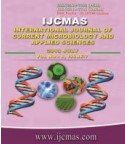


 National Academy of Agricultural Sciences (NAAS)
National Academy of Agricultural Sciences (NAAS)

|
PRINT ISSN : 2319-7692
Online ISSN : 2319-7706 Issues : 12 per year Publisher : Excellent Publishers Email : editorijcmas@gmail.com / submit@ijcmas.com Editor-in-chief: Dr.M.Prakash Index Copernicus ICV 2018: 95.39 NAAS RATING 2020: 5.38 |
Rose, the flower queen is an important traditional as well as modern commercial flower crop. Since roses are adapted to a cooler climate of 18-28 0 C, the cultivation is limited to the temperate regions and breeding for tropics is the need of the hour. The breeding programme should be focussed on heritable characters to get desired level of improvement in the progeny. Before going for any selection procedure, the genetic variability estimates like GCV, PCV, heritability and genetic advance has to be assessed for effective parental selection. Ten loose flower varieties viz. Arka Parimala, Sherba Gold, Mirabel, Vernish, Chersishma, Jadiov, Star Light, Spray Orange, Spray Yellow and Red varnish were grown under a naturally ventilated poly house of Department of Floriculture and Landscaping, College of Horticulture, Vellanikkara. The various quantitative traits were subjected to estimation of genetic parameters and the traits with high GCV and PCV indicates wide variability among the varieties for these characters. The characters number of flowers per sprout, number of flowers per plant, number of petals per flower and flower diameter at fully opened stage exhibited high heritability coupled with high genetic gain indicating that the expression of these characters are due to the additive gene effect and selection will be effective through these characters. The floral parameters of the ten rose varieties were subjected to cluster analysis and they were grouped in to six clusters at 6 percent similarity coefficient based on quantitative traits whereas the varieties were grouped into four clusters at 36 per cent similarity coefficient based on qualitative characters indicating wide variability among the selected rose varieties. The wide variability present in the population can be exploited in the selection process for developing new varieties suited to the tropics.
 |
 |
 |
 |
 |